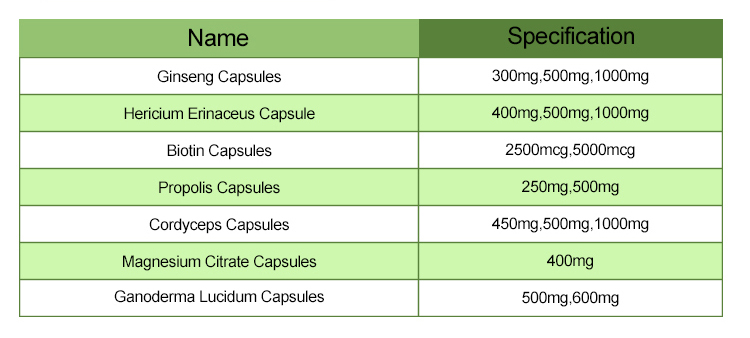Magnesium citrate capsules typically contain two main ingredients:
1.Magnesium Citrate: This is the active ingredient, a compound composed of magnesium and citric acid. Magnesium citrate is a highly bioavailable form of magnesium, meaning it is easily absorbed by the body. It’s commonly used as a dietary supplement to help address magnesium deficiency, support bone health, muscle function, and various other bodily processes.
2.Inactive Ingredients: These may include various additives or fillers, such as:
Gelatin: Often used to make the capsule shell.
Magnesium Stearate: A commonly used lubricant in supplement manufacturing to prevent ingredients from sticking to machinery during processing.
Silica: An anti-caking agent or flow agent, often added to improve the manufacturing process and prevent clumping of the powder.
Microcrystalline cellulose: A commonly used bulking agent or filler in capsule formulations, which helps ensure the proper fill volume of the capsule.

It’s essential to read the label of the specific magnesium citrate supplement you’re considering, as formulations can vary between brands and manufacturers. Additionally, some formulations may include other ingredients such as vitamins or minerals for added benefits.
The application of Magnesium Citrate Capsules
Magnesium citrate capsules are a popular dietary supplement used for various purposes due to their potential health benefits. Here are some common applications of magnesium citrate capsules:
1.Promoting Bone Health: Magnesium is essential for bone health as it helps regulate calcium and vitamin D levels in the body. Adequate magnesium intake may help prevent osteoporosis and improve bone density.
2.Supporting Heart Health: Magnesium plays a role in maintaining a healthy heart rhythm and regulating blood pressure. Supplementing with magnesium citrate may help lower blood pressure and reduce the risk of cardiovascular disease.
3.Relieving Constipation: Magnesium citrate is often used as a laxative to relieve occasional constipation. It works by drawing water into the intestines, which softens the stool and promotes bowel movements. However, it’s important to use magnesium citrate for constipation only as directed by a healthcare professional, as excessive use can lead to electrolyte imbalances and dehydration.
4.Managing Muscle Cramps and Spasms: Magnesium is involved in muscle function and relaxation. Some people find that supplementing with magnesium citrate can help reduce muscle cramps and spasms, particularly in athletes or individuals with muscle-related conditions.
5.Supporting Nerve Function: Magnesium is important for nerve transmission and neuromuscular function. Adequate magnesium levels may help support healthy nerve function and reduce the risk of neurological disorders.
6.Improving Sleep Quality: Magnesium plays a role in regulating the body’s stress response and promoting relaxation. Some individuals take magnesium citrate supplements to help improve sleep quality and reduce insomnia symptoms.

7.Alleviating PMS Symptoms: Some women find that supplementing with magnesium citrate can help alleviate symptoms of premenstrual syndrome (PMS), such as bloating, mood swings, and menstrual cramps.
8.Managing Migraine Headaches: There is some evidence to suggest that magnesium supplementation may help reduce the frequency and severity of migraine headaches in some individuals.
It’s important to note that while magnesium citrate capsules can offer various health benefits, they should be used as part of a balanced diet and lifestyle. It’s also advisable to consult with a healthcare professional before starting any new supplement regimen, especially if you have underlying health conditions or are taking medications. Additionally, be sure to follow the recommended dosage instructions provided on the product label or as directed by your healthcare provider.
